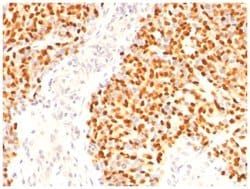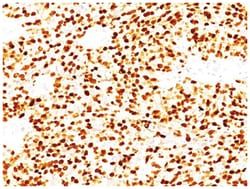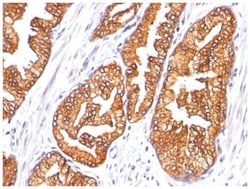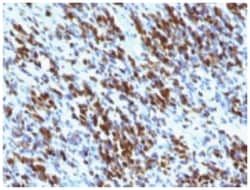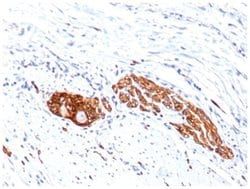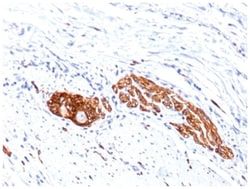Myogenin Mouse, Clone: MGN185 + F5D, Novus Biologicals™
Mouse Monoclonal Antibody
Manufacturer: Fischer Scientific
The price for this product is unavailable. Please request a quote
Antigen
Myogenin
Concentration
0.2mg/mL
Applications
Western Blot, Flow Cytometry, Immunocytochemistry, Immunofluorescence, Immunoprecipitation, Immunohistochemistry (Paraffin)
Conjugate
Unconjugated
Host Species
Mouse
Research Discipline
Cancer, Stem Cell Markers, Transcription Factors and Regulators
Formulation
PBS with 0.05% BSA. with 0.05% Sodium Azide
Gene Alias
BHLHC3, bHLHc3Myogenic factor-4; myogenin, Class C basic helix-loop-helix protein 3, myf-4, MYF4myogenin, Myogenic factor 4, MYOGENIN, myogenin (myogenic factor 4)
Gene Symbols
MYOG
Isotype
IgG
Purification Method
Protein A purified
Test Specificity
Myogenin is a member of the MyoD family of myogenic basic helix-loop-helix (bHLH) transcription factors that also includes MyoD, Myf-5, and MRF4 (also known as herculinor Myf-6). MyoD family members are expressed exclusively in skeletal muscle and play a key role in activating myogenesis by binding to enhancer sequences of muscle-specific genes. The regulatory domain of MyoD is approximately 70 amino acids in length and includes both a basic DNA binding motif and a bHLH dimerization motif. MyoD family members share about 80% amino acid homology in their bHLH motifs. Anti-myogenin labels the nuclei of myoblasts in developing muscle tissue, and is expressed in tumor cell nuclei of rhabdomyosarcoma and some leiomyosarcomas. Positive nuclear staining may occur in Wilms tumor.
Clone
MGN185 + F5D
Dilution
Western Blot 0.5-1.0ug/ml, Flow Cytometry 0.5-1ug/million cells, Immunocytochemistry/Immunofluorescence 0.5-1ug/ml, Immunoprecipitation 0.5-1ug/500ug protein lysate, Immunohistochemistry-Paraffin 0.5-1ug/ml, Immunohistochemistry-Frozen 0.5-1ug/ml
Classification
Monoclonal
Form
Purified
Regulatory Status
RUO
Target Species
Human, Mouse, Rat, Porcine, Feline
Gene Accession No.
P15173
Gene ID (Entrez)
4656
Immunogen
Human myogenin recombinant protein (MGN185); Rat myogenin recombinant fragment containing amino acid 30-224 (F5D)
Primary or Secondary
Primary
Content And Storage
Store at 4C.
Molecular Weight of Antigen
34 kDa
Description
- Myogenin Monoclonal specifically detects Myogenin in Human, Mouse, Rat, Porcine, Feline samples
- It is validated for Immunohistochemistry, Immunohistochemistry-Paraffin.
